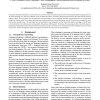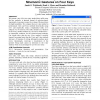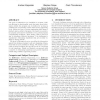47 search results - page 3 / 10 » Session 3: Human Language Evaluation |
IJMMS
2007
13 years 5 months ago
2007
Affective reasoning plays an increasingly important role in cognitive accounts of social interaction. Humans continuously assess one another's situational context, modify the...
LREC
2008
13 years 6 months ago
2008
This paper discusses development and evaluation of a practical, valid and reliable instrument for evaluating the spoken language abilities of second-language (L2) learners of Engl...
CHI
2006
ACM
14 years 5 months ago
2006
ACM
We present a new 4-key text entry method that, unlike most few-key methods, is gestural instead of selection-based. Importantly, its gestures mimic the writing of Roman letters fo...
DRM
2007
Springer
13 years 11 months ago
2007
Springer
The goal of obfuscation is to transform a program, without affecting its functionality, such that some secret information within the program can be hidden for as long as possible...
SIGCSE
2005
ACM
13 years 11 months ago
2005
ACM
Last year we described the PL-Detective, a system for building exercises and demonstrations in a programming languages course. One of the main goals of the PL-Detective was to pro...



